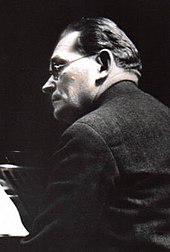Jaromír Herle
Jaromír Herle (born August 23, 1872 in Moravské Budějovice , † November 30, 1945 in Prague ) was a Czech composer and choir director .
Live and act
Jaromír Herle came from the family of a postal worker. He received piano and violin lessons as a child. At the age of 14 he was admitted to the Prague Organ School, where his teacher was František Zdeněk Skuherský . Through his uncle, the music publisher František Augustin Urbánek, Jaromír Herle came into contact early on with leading Czech composers such as Antonín Dvořák , Zdeněk Fibich , Karel Bendl and Josef Bohuslav Foerster .
From 1890 to 1894 Herle played the violin and french horn in a Prague military band, then moved to Serbia and taught singing at the grammar school in Šabac , where he gained his first experience in leading a choir. From 1898 he lived in Vienna , became a member of the choir of the Vienna State Opera and from 1899 the deputy choir director. He also directed the Czech choirs Lumír and Slovanský zpěvácký spolek (Slavonic Choral Society) . With Lumir in Vienna he performed the cantatas Svatební košile (The Wedding Shirt ) by Antonín Dvořák (1911), Bouře (The Tempest) by Vítězslav Novák (1913) and Česká píseň by Bedřich Smetana and the oratorio Stabat Mater by Josef Bohuslav Foerster . During the First World War he studied the operas Prodaná nevěsta (The Bartered Bride) by Bedřich Smetana and V Studni (In the Fountain) by Vilém Blodek in Vienna and made Czech music known in the Austrian capital. In Vienna he also appeared as a piano accompanist, solo singer ( tenor ) and member of a vocal quartet.
After the establishment of the Czechoslovak Republic in 1918, he returned to Prague and worked as a choir director, singer and organist in various Prague churches. He continued his collaboration with the Vienna State Opera and the Lumír Choir until 1921. The high point of his career was his appointment as choirmaster of the Prague National Theater (1921-1936) and in the same year as choir director of the Prague Hlahol (1921-1939).
With Hlahol he studied a wide repertoire of demanding vocal music and vocal-instrumental music. Worth mentioning are the ballads by Vítězslav Novák, Stabat Mater by Antonín Dvořák, the 9th Symphony by Ludwig van Beethoven , the cantata O posledních věcech člověka (On the last things of man) by Ladislav Vycpálek and Requiem by Hector Berlioz . Under his leadership, the number of Hlahol members exceeded a thousand for the first time. With the choir he made successful concert tours to Yugoslavia , Germany and Poland and in 1923 won first prize in the international choir competition in Amsterdam . The Hlahol concert in Frankfurt am Main on the occasion of the international exhibition Music in the Lives of Nations in 1927 was another major success abroad. Under his direction, Hlahol also worked with foreign guest conductors.
As a composer, Jaromír Herle left behind an extensive work with a focus on church music . Among other things , he composed masses , Requiem and Te Deum , but also songs and choirs in various formations. His compositions have remained largely unknown.
literature
- Josef Stanislav: Jaromír Herle. Nástin životopisný a bibliografický . Praha 1932 (Czech).
- Vladimír Spousta: Hudební skladatel a sbormistr Jaromír Herle: moravskobudějovický rodák . Muzejní Spolek, Moravské Budějovice 2012 (Czech, 134 pages).
Web links
- Miloš Zapletal: Herle, Jaromír. In: Český hudební slovník osob a institucí. October 6, 2010 (Czech, with a detailed catalog raisonné).
- Jaromír Herle (1872-1945). In: České sbory.cz. August 23, 2007(Czech).
- Aleš Mihálik: History sboru ND, uměleckého souboru Opery Národního divadla. In: Sbor Národního divadla v Praze. (Czech).
- S. Klein, Š. Blažíčková: The history of Prague's Hlahol. In: hlahol.cz. 2007 (German, English).
- Viktor Velek: Z Vídně do Československa aneb Za osudy českovídeňských hudebních reemigrantů. In: vltava.rozhlas.cz. September 3, 2019 (Czech).
- Herle, Jaromír. In: Databáze Národní knihovny ČR. (Czech).
Individual evidence
- ↑ a b c d Miloš Zapletal: Herle, Jaromír. In: Český hudební slovník osob a institucí. October 6, 2010, accessed May 14, 2020 (Czech).
- ↑ Aleš Mihálik: History sboru ND, uměleckého souboru Opery Národního divadla. In: Sbor Národního divadla v Praze. Retrieved May 14, 2020 (Czech).
- ↑ Jaromír Herle (1872–1945). In: České sbory.cz. August 23, 2007, accessed May 14, 2020 (Czech).
| personal data | |
|---|---|
| SURNAME | Herle, Jaromír |
| BRIEF DESCRIPTION | Czech composer and choir director |
| DATE OF BIRTH | August 23, 1872 |
| PLACE OF BIRTH | Moravské Budějovice |
| DATE OF DEATH | November 30, 1945 |
| Place of death | Prague |
